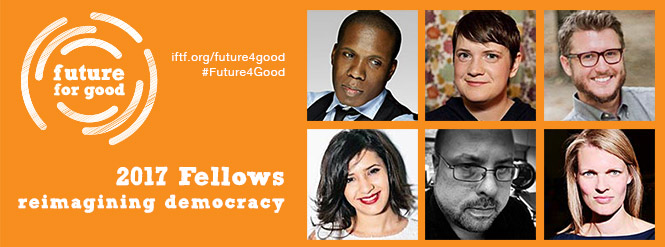Future Now
The IFTF Blog
IFTF Announces 2017 ‘Future for Good’ Fellows
FOR IMMEDIATE RELEASE
Fellows from a broad range of disciplines will work on projects designed to strengthen democracy, which is facing unprecedented challenges ranging from the rise of computational propaganda to illicit efforts to influence elections
Palo Alto, Calif., April 21, 2017—The Institute for the Future (IFTF) has named six fellows who will work on solutions to the growing challenges facing democracy across the globe to its fifth annual Future for Good program.

IFTF chose the fellows—entrepreneurs and researchers with diverse backgrounds and perspectives—because of their important and innovative work in creating, rethinking and testing new systems of governance in areas that include journalism, the gig economy, cross-cultural entrepreneurship and more.
The Future for Good initiative brings together innovative social thinkers who ask provocative questions and seek actionable, impactful answers about the urgent future. This year, IFTF is focusing on the future of democracy.
IFTF’s fellows are already using network technologies to prototype solutions to the challenges facing democracy and will participate in IFTF’s Democracy Futures Lab, which brings together futures thinkers, technologists, philanthropists, designers, policymakers and social innovators to re-imagine democracy. The goal is to design systems and tools for governance models that can meet the complex global challenges of the 21st Century.
“The rise of tech-enabled propaganda, fake news, international conflict and illicit efforts to influence elections have eroded political institutions and, with them, democracy as we know it,” said IFTF Executive Director Marina Gorbis. “That makes the projects our fellows are working on more important than ever. While their projects may seem disparate, they’re connected by the goal of trying to reinvent governance.”
Democracy Futures Lab research includes:
- New models for open, participatory governance, from global to hyper-local
- The future of journalism and computational propaganda
- Global security, safety, conflict, and privacy in the networked world
- Participatory economic systems that foster social and income equitability
The Fellows
Yasmine El Beggari, Founder, Voyaj
Voyaj builds cross-cultural exchange platforms to connect and empower entrepreneurs and citizens around the world. Working with the World Bank, Voyaj is building one such program for women entrepreneurs across the Middle East, allowing them to connect to resources, capital, and networks that would otherwise be inaccessible.
Kristin Sharp, Executive Director, SHIFT
The Shift Commission on Work, Workers, and Technology brings together a community of leaders who want to understand the massive transformations in work and the lives of workers.
Michelle Miller, Co-founder, Co-Worker.org
Coworker.org is a digital platform for worker voice. Since its founding in 2013, Coworker.org has catalyzed the growth of global, independent employee networks advancing wins like paid parental leave benefits at Netflix, scheduling reform at Starbucks and wage increases for REI employees, among many others.
John W. Little, Founder, Blogs of War
Blogs of War, created in 2002, leverages decades of Internet experience (pre-dating the web) and a global network of contacts to mine, analyze, aggregate, and surface open source information with an eye towards identifying important trends at their origin. John’s projects and analysis, on topics ranging from terrorist use of social media to the impact of encryption on intelligence collection and law enforcement,
Matt Mitchell, Founder, CryptoHarlem
CryptoHarlem creates impromptu workshops teaching basic cryptography tools to the predominately African American community in upper Manhattan. Matt also trains activists and journalists (as an independent trainer for Global Journalist Security) in digital security.
Sam Woolley, Researcher, Oxford Internet Institute
Sam Woolley is part of Oxford Internet Institute’s Computational Propaganda research team. He specializes in the study of automation and politics, with special interests in political communication and science and technology studies.
“This year we kicked off our fellowship at a retreat in Iceland, a leading innovator in open governance,” said Gorbis. “As we think about transformations in democracy, it’s important to recognize that change can happen first in small places and then diffuse around the world more easily. Iceland—an island country known for having the oldest continuous Parliament in the world—can be thought of as one such place, making it the perfect setting to start the fellowship with a cohort focused on the future of democracy.”
CONTACT
Erin Musgrave: (530) 864-7014 | emusgrave@affiliates.iftf.org
Conan Knoll: (831) 524-6764 | conan@emcstrategies.com
###
About the Future for Good Fellowship
The IFTF Future for Good Fellowship program brings the future into being, starting today. Launched in 2013, each year IFTF invites six Future for Good fellows to join IFTF for four months to create visions and develop actions for our collective good. www.iftf.org/future4good
About Institute for the Future
Institute for the Future (IFTF) is an independent, nonprofit strategic research group with almost 50 years of forecasting experience. The core of our work is identifying emerging discontinuities that will transform global society and the global marketplace. We provide organizations with insights into business strategy, design process, innovation, and social dilemmas. Our research spans a broad territory of deeply transformative trends, from health and health care to technology, the workplace, and human identity. IFTF is based in Palo Alto, California.



